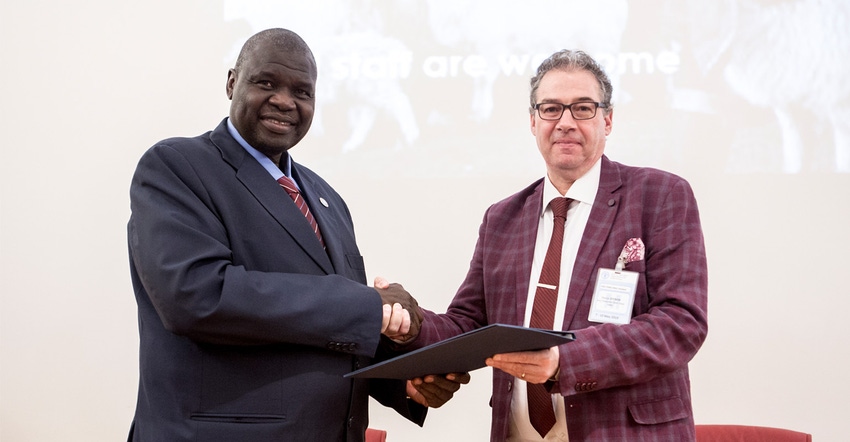May 13, 2019

Texas A&M AgriLife, part of the Texas A&M University System, and the Food and Agriculture Organization (FAO) of the United Nations renewed their agreement May 10 to expand capacity for sustainable agriculture and natural resource management in developing countries.
The initial partnership began in 2014 and expanded to four enhanced program areas involving work done by Texas A&M AgriLife Research, A&M System scientists and the FAO.
All are working together to combat world hunger by building capacity and resilience for sustainable agriculture and natural resource management in meeting global food needs and improve livelihoods of farming communities worldwide.
“We are committed to solving challenges facing agriculture in diverse settings with global impact,” said Dr. Patrick Stover, vice chancellor and dean of agriculture and life sciences at Texas A&M AgriLife and director of AgriLife Research.
“Our long-standing partnership with FAO has generated numerous multidisciplinary collaborations to address real-world challenges in sustainable crop and livestock production, environmental stewardship, animal and veterinary public health, early warning and risk management systems, agribusiness development, and the development of safe, healthy and nutritious food systems,” Stover said. “Advances in these areas are essential for sustainable human and planetary health and well-being.”
“Working together, FAO and Texas A&M have been able to ensure there is greater access to knowledge and expertise in areas of animal health and production, including transboundary diseases, increasing resiliency in Africa for improved livestock management, and sustainable agriculture water usage,” said Daniel Gustafson, FAO’s Deputy Director-General (Programmes). “This is a prime example of how, working in partnership, we can make progress towards achieving the sustainable development goals.”
The agreement has provided a successful framework to progressively enhance and expand collaborations in support of both organization’s missions as well as the United Nations’ sustainable development goals.
Under the renewed agreement, the A&M System and FAO are carrying out initiatives to strengthen agricultural production innovations in the following areas:
Provide One Health training for animal and zoonotic disease prevention and response.
Enhance global emergency management.
Provide expertise to address key antimicrobial resistance needs.
Improve sustainable agriculture water use and understanding of household water insecurity.
Increase human resource capacities to support sustainable development and food security.
Monitoring evaluation and learning assessment and analysis.
Laboratory capacity building and training.
Hands-on training in transboundary animal diseases.
In addition, expanded collaborations will focus on priority needs to build resilience – particularly in drought areas related to feed, forage needs and tools for enhanced early warning for better livestock water and forage management.
Resilience efforts also include improving value-chain management, efficiency, quality and safety, which in turn promotes household and national economic stability, improves livelihoods for small-holder farming communities, improves food safety and security, and helps mitigate the negative impacts of disaster and decreases potential for conflict. Resilience activity areas will also encompass capacity building/training as well as a gender and youth development focus.
The cooperation is at country, regional and global levels as mutually agreed.
“Our rich history includes a strong connection between farmers and the land on which they farm throughout Texas, the nation and internationally,” said Texas A&M University System Chancellor John Sharp. “I applaud our leadership in focusing on value-chain management as the key to improving both supply and security of food for communities around the world.”
Sharp said the partnership is an opportunity to leverage the strengths of both entities, allowing collaboration on matters of common interest.
In addition to Stover, Texas A&M AgriLife leaders from College Station at the announcement in Rome included:
Dr. David Lunt, associate director/chief operations officer, AgriLife Research.
Dr. Elizabeth Parker, international and strategic partnerships specialist, AgriLife Research.
Dr. Elsa Murano, director, Borlaug Institute for International Agriculture.
Dr. John Tracy, director, Texas Water Resources Institute.
Dr. Heather Simmons, associate director, Institute for Infectious Animal Diseases.
Dr. Jay Angerer, associate professor, the Texas A&M AgriLife Blackland Research and Extension Center, Temple.
Source: is AgriLife TODAY, which is solely responsible for the information provided and is wholly owned by the source. Informa Business Media and all its subsidiaries are not responsible for any of the content contained in this information asset.
You May Also Like




